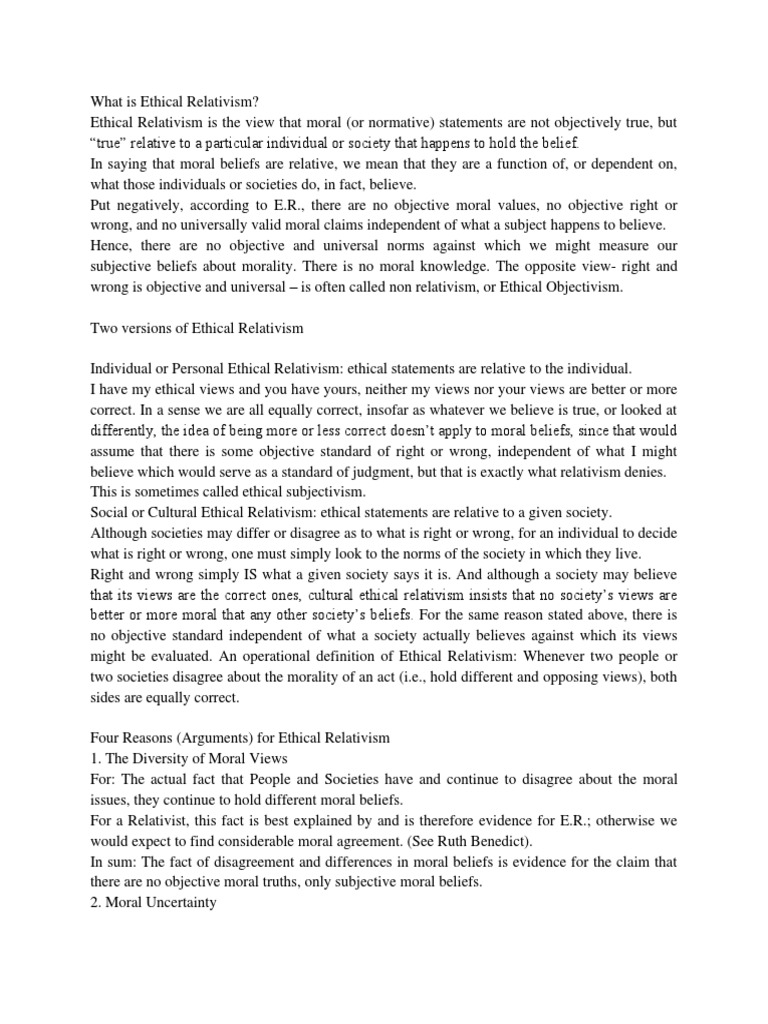Ethical moral relativism represents a complex and nuanced philosophical stance within the discourse of ethics and morality. Unlike absolutist positions, which assert universal moral truths that apply to all individuals at all times, moral relativism posits that moral judgments are not universally applicable but rather contingent upon cultural, societal, or situational contexts. This distinction highlights the variability of moral norms and the diverse fabric from which human ethics are woven.
Understanding ethical moral relativism requires an exploration of its foundational principles. At its core, moral relativism can be segmented into three predominant types: cultural relativism, individual relativism (or subjectivism), and situational ethics. Each variety offers different lenses through which one can examine moral questions, thus expanding the potential for ethical analysis.
Cultural Relativism stands as one of the most significant branches of ethical relativism. This perspective argues that moral systems and beliefs are products of distinct cultures and social structures. What is considered morally acceptable in one culture might be deemed unethical in another. For instance, practices such as arranged marriages may be viewed with suspicion in Western societies, yet they are intrinsic and respected elements of social organization in many Eastern cultures. Consequently, cultural relativism encourages tolerance and understanding of diverse moral frameworks, advocating for respect of cultural differences while critiquing ethnocentrism.
However, cultural relativism is not without its complexities and criticisms. Detractors argue that it can lead to moral paralysis, where the inability to impose a universal moral standard potentially permits abhorrent practices, such as human rights violations, to be justified on the grounds of cultural propriety. Advocates of this viewpoint counter that such criticisms simplify the rich tapestry of cultural ethics and ignore the nuances that characterize moral discourse within any given society.
Individual Relativism or subjectivism shifts the focus from society to individual belief systems. This form underscores that morality is a personal choice, heavily influenced by one’s desires, emotions, and subjective intuitions. Under this lens, individuals construct their own moralities based on personal experiences and reflections. While this perspective promotes the idea of personal autonomy in moral decision-making, it raises concerns about the potential for moral nihilism. If morality is purely subjective, the implications for accountability and interpersonal moral discourse may become tenuous. An individual may claim moral justification for actions that others find reprehensible, leading to conflicts and an erosion of communal values.
Yet, moral subjectivism can foster a dynamic ethical dialogue, encouraging introspection and personal growth. This individualistic approach allows for a re-examination of one’s values, enabling adaptive rather than rigid moral landscapes. Herein lies the paradox: while individual relativism promotes the exploration of diverse moral landscapes, it simultaneously risks descending into moral relativism’s fractious depths—where no action can be universally condemned.
Situational Ethics composes the third pillar of ethical moral relativism, focusing on the particular context surrounding a moral decision. This approach emphasizes that moral judgments should be made based on the specific circumstances of an action rather than through a predetermined set of rules. Situational ethics can encourage flexibility and sensitivity, advocating that individuals seek the most loving or compassionate outcome in any given situation. For example, the moral dilemma surrounding euthanasia can be approached with plurality by considering the unique circumstances of each case, rather than applying rigid legal or ethical rules uniformly.
However, reliance on situational ethics invites scrutiny regarding the consistency of moral judgments. Critics argue that an adherence to changing contexts may result in unpredictable moral outcomes. This sentiment calls into question whether ethical guidelines can offer reliable frameworks for behavior. Nevertheless, proponents argue that life is inherently complex and that moral decisions often require a discerning balance between principles and particulars.
The discussion on ethical moral relativism inevitably leads to broader societal implications. In an increasingly globalized world, the collision of diverse ethical systems challenges established norms and compels individuals to confront the pluralism of moral thought. Understanding ethical relativism becomes vital not only for philosophers but also for sociologists, policymakers, and global citizens navigating intercultural interactions.
Moreover, ethical moral relativism engages with critical contemporary issues. Consider climate ethics, where differing cultural values shape nations’ responses to environmental challenges. A culturally relativistic perspective may highlight the divergent ethical frameworks regarding climate change across different nations. This sheds light on the disparities in responsibility and response, prompting broader dialogue on shared ethical imperatives for environmental stewardship that transcend cultural boundaries.
The interplay between ethical moral relativism and global citizenship urges individuals to embrace intercultural understanding while acknowledging the shared moral responsibilities humanity bears toward the planet. Such an approach does not advocate for a simplistic merging of values but instead acknowledges the pivotal importance of respectful discourse and collaborative moral exploration.
In conclusion, ethical moral relativism, in its various forms, serves as a critical lens through which one can examine the complexities of morality in a pluralistic society. By embracing cultural, individual, and situational perspectives of ethics, it fosters understanding and dialogue in a world marked by moral diversity. This philosophical approach invites individuals to navigate the intricate moral landscapes of human existence, thereby enriching both personal and collective ethical consciousness.
